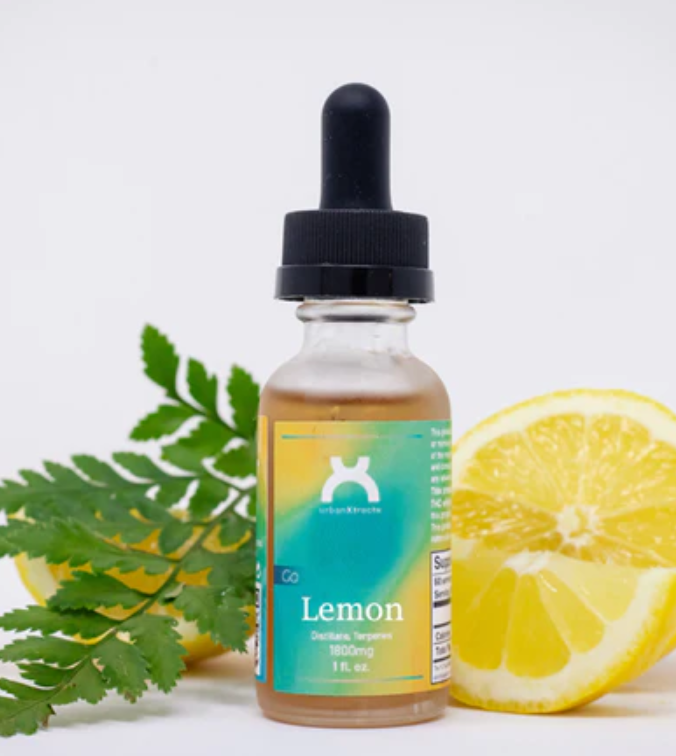Despite being relatively new to our culture, CBD has been delivering its calming effects for as long as the 1980s, according to some estimates, and as far back as the ancient world, according to others. With it, a seemingly limitless array of formulations—from capsules and oils to lotions and seltzer—have appeared, each offering an even higher dose of CBD than the last one. CBD Lemon Tincture, however, continues to be cloaked in mystery, in part due to their antiquated apothecary-style packaging, but probably more so due to the way they are consumed: a few drops at a time, beneath the tongue. In this article, Tieraona Low Dog, M.D., a specialist in herbal medicine and women's health, and Kevin Hill, M.D., Director of the Division of Addiction Psychiatry at Beth Israel Deaconess Medical Center and Assistant Professor of Psychiatry at Harvard Medical School dispel the mystery surrounding CBD Lemon Tincture.
What Exactly Is CBD Lemon Tincture?
According to Hill, the cannabis plant contains more than 120 cannabinoids among its hundreds of other compounds. Two of those cannabinoids, THC, and CBD, are the most well-known. THC, which gives marijuana its euphoric effects or "high," and CBD, which, according to Low Dog, has some anti-inflammatory, anti-seizure, anti-anxiety, and analgesic characteristics. The two compounds function as opposites in plants, with CBD serving as a kind of buffer to the effects of THC. It's like a yin and yang, sort of. According to Hill, THC causes the high while CBD has no such effect.
Describe CBD Lemon Tincture
An herbal tincture is created by extracting chemicals from a plant—in this example, the cannabis plant—using a solution of alcohol and water. As opposed to alcohol, you might occasionally get extracts called tinctures that use glycerin, vinegar, or oil as the solvent. These have the advantage of not including alcohol, but their potency may not always be as high as that of an alcohol-water extract.
What Are The Advantages of Utilizing CBD Lemon Tincture And How Are They Made?
The main purpose of CBD Lemon Tincture is to help with pain relief and anxiety relief. They are often prepared from high CBD hemp strains and contain 60 to 70 percent alcohol. Tinctures are practical, have a long shelf life, and are readily absorbed when taken sublingually. The number of drops ingested can be changed to change the dose, according to Low Dog. Although CBD preparations of all kinds show a lot of promise, according to Hill, there is still a ton of research to be done. "At this time, the pace and scope of the studies simply haven't kept up with the enthusiasm. Numerous cannabidiol's medical applications are solely supported by animal research, if any studies at all. So, therein lies the potential difficulty.
Exist Any Negative Effects Then?
Finally, [CBD] is a rather harmless substance, according to Hill. Even so, he continues, "there is still a lot we don't know about it, such how it interacts with other drugs patients could be taking and what the long-term implications are. And perhaps most importantly, he worries that "in some cases, individuals want to utilize it in place of evidence-based treatment, and that can be a clinical issue in certain circumstances."
Which is Superior, CBD Oil or CBD Tincture?
A Lemon CBD Oil Tincture may provide a wider variety of hemp chemicals than an oil extraction, according to Low Dog. "Consumers who are sensitive to alcohol frequently choose hemp oil over tincture. Both can be applied topically, although hemp oil is typically less irritating and easier to apply, according to the expert. Hill advises to be aware of what you're getting on that note: According to him, using a CBD lotion on your skin won't cause it to enter your bloodstream. The same as other over-the-counter drugs, it can act as a local anti-inflammatory; however, Lemon CBD Oil Tincture may not offer much more relief and will likely be much more expensive.
How Can You Be Certain Of What You're Getting? What Ought You to Watch Out For?
Quality is always a concern, especially in an industry that is still developing, like the cannabis market, according to Low Dog. She's correct, too. According to a 2017 study that was published in the Journal of the American Medical Association, just 30% of the CBD products that were commercially accessible had proper labels. According to Hill, "many of them had more CBD than they were meant to, many had less, and some had none." As a bio-accumulator, the cannabis plant will be impacted by heavy metals and toxins in the soil, thus he advises buying organic and broad-spectrum cannabis, which contains the whole spectrum of phytocannabinoids but not THC.
